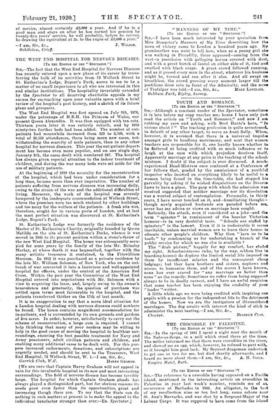YOUTH AND ROMANCE.
[To eat EDITOR or THE " SPECTATOR."] Sia,—Although a constant reader of the Spectator, sometimes it is late before my copy reaches me; hence I have only just read the article on "Youth and Romance," and now I am rubbing my eyes and asking, with Bret Harte's hero, " Is visions about ?" The teaching profession is quite accustomed, in default of any other target, to serve as Aunt Sally. When. however, it is assumed that there is a universal impulse amongst girls to headlong matrimony, and next that women teachers are responsible for it, one hardly knows whether to be flattered at being credited with so much influence or to laugh at the ease with which prejudice deceives itself. Apparently marriage at any price is the teaching of the school- mistress. I doubt if the subject is ever discussed. A much- experienced Head-Mistress once confessed at a Conference of her fellows that, goaded by the omniscience of a youthful inspector who insisted on everything likely to be useful to n woman being found in the time-table, she had stopped his garrulity by asking if he wished disquisitions on the Divorce Laws to have a place. The gasp with which the admission was received suggested that neither marriage nor its dissolution was a wonted subject of contemplation. Personally, in thirty years, I have never touched on it, and—humiliating thought— though newly acquired husbands are paraded before me, never has my advice or views on marriage been sought.
Seriously, the attack, even if considered as a joke—and the term " spinster " is reminiscent of the heavier Victorian humour—is in very doubtful taste. " Schools are staffed by spinsters" is the lament. Even if it is undesirable it seems inevitable, unless married women are to leave their homes to educate other people's children. Why then " lain us to be toads" by condemning us for undertaking a branch of the public service for which no One else is available ?
The "drab picture," happily for my comfort, has eluded my sight. Schoolmistresses (who, by the way, seldom live is boarding-houses) do deplore the limited social life imposed on them by insufficient salaries and the consequent cheap lodgings; but they have brothers and sisters, nephews and nieces, to humanize them, and of the scores I have known. none has ever craved for " any marriage as better than none" as the remedy. Sometimes we suffer from being supposed always to be in deadly earnest, and I have an awful suspicion that some teacher has been enjoying the credulity of your " leader "-writer.
A little while ago we were being credited with inspiring our pupils with a passion for the independent life to the detriment of the homes. Now we are the instigators of ill-considered marriages. The dog awaits with interest the kind of stick to administer the next beating.—I am, Sir, &c.,


































 Previous page
Previous page